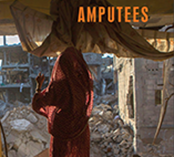
A new report by Physicians for Human Rights - Israel (PHRI), a member of the Safeguarding Health in Conflict Coalition, analyzes the deteriorated state of the health system in Gaza through the lens of Palestinians who were injured during the recent war and, as a result, underwent amputation.
According to the report, Amputees, the Israeli summer 2014 offensive on Gaza produced approximately one hundred people who lost limbs and other body parts. Their challenges—and of all those injured—did not end with the war. PHRI reviews the limited care and rehabilitation possibilities available to them in Gaza, and the obstacles facing the amputees who try to receive care outside Gaza.
When voices within Israel call for the renewal of hostilities, this report is a reminder of how the impact of war lasts far beyond its formal duration.
As is summarized in the coalition’s 2015 report, there is credible evidence that Israeli forces unlawfully targeted hospitals, clinics, ambulances, and health workers during the Israeli offensive. Seventeen hospitals and 56 primary health care centers were damaged; 16 health workers were killed and 83 health workers, most of whom were ambulance drivers, were injured.
Amputees includes stories from PHRI’s blog that follows men and women in Gaza who continue to cope with amputation and need corrective surgery before they can even be fitted with prosthesis. It shows how they—like other Palestinians in Gaza who require medical attention—continue to receive deficient treatment within Gaza largely as a result of Israel's siege and its violation of international law to allow access to health care.
The current difficulties faced by the people who have undergone amputation are a result of various factors at different stages of the medical process. As detailed in the report, these include:
- Delays caused by attacks on and hindrance of ambulances, destruction of health facilities, and limited health workers with heavy workloads resulted in unnecessary complications and partial and faulty medical treatment during the war. For example, the triage of patients was often poorly managed, and in some cases patients had a limb amputated without it being medically necessary—health professionals sometimes preferred amputating a limb in order to save a life, as they lacked the time and the means to focus on saving the injured limb. Also, due to premature discharges in order to admit new injured people, medical treatment was often not completed, and some patients experienced complications and disabilities that could have been avoided. In many cases, the medical treatment of the stump, or the amputation itself, were performed in such a way that prosthesis cannot be fitted until the amputees undergo further surgery, which is unavailable in Gaza on an ongoing basis.
- Only 15% of the population’s rehabilitation needs are currently being met, according to Mustafa Abed, director of rehabilitation services at Medical Relief. Al-Wafa—Gaza's only rehabilitation hospital—was bombed during the war and, because of extensive damage, staff are only able to take in roughly a quarter of the patients it could see before the war. Currently, Gaza has 2 beds for every 100,000 inhabitants, compared to 9 beds for the same amount of inhabitants in Israel. Prosthetics are comparably low-tech and of inferior quality, and for upper body injuries, only cosmetic prosthetics are available.
- The division between Gaza and the West Bank creates difficulties in receiving prostheses and treatment elsewhere. Palestinian Ministry of Health funds are limited to cover treatment and surgery, and when funds are available, Israel's restrictions on the movement of patients result in delays that impact medical treatment. Freedom of movement for patients has been instrumentalized for political goals—with PHRI increasingly recording cases where the request to leave for medical treatment is made conditional upon undergoing Israel Security Agenda questioning—a violation of human rights.
With respect to Gaza, PHRI calls on the international community to pressure Israel to:
End the siege on Gaza and thereby allow the exercise of the right to health as defined by international law, and lift the restrictions and obstacles it creates for all Palestinians requiring medical treatment—specifically amputees.

